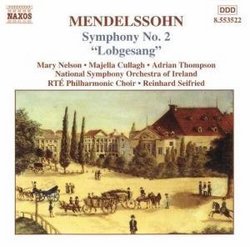| All Artists: Felix Mendelssohn, Reinhard Seifried, Adrian Thompson, Majella Cullagh, National Symphony Orchestra of Ireland, RTE Philharmonic Choir Title: Mendelssohn - Symphony No. 2 "Lobgesang" / Mary Nelson · M. Cullagh · A. Thompson · R. Seifried Members Wishing: 0 Total Copies: 0 Label: Naxos Release Date: 5/15/2001 Genre: Classical Style: Symphonies Number of Discs: 1 SwapaCD Credits: 1 UPC: 730099452229 |
Search - Felix Mendelssohn, Reinhard Seifried, Adrian Thompson :: Mendelssohn - Symphony No. 2 "Lobgesang" / Mary Nelson · M. Cullagh · A. Thompson · R. Seifried
 | Felix Mendelssohn, Reinhard Seifried, Adrian Thompson Mendelssohn - Symphony No. 2 "Lobgesang" / Mary Nelson · M. Cullagh · A. Thompson · R. Seifried Genre: Classical
|
Larger Image |
CD Details |
CD ReviewsA Great Recording of An Overlooked Masterpiece Timothy Dougal | Madison, Wi United States | 08/17/2002 (5 out of 5 stars) "Mendelssohn's Symphony #2 is one of the most hard to find items in the classical repertoire, and for the life of me, I can't figure out why. What I do know is that outside of complete sets of Mendelssohn's symphonies until now you could generally only get this terrific choral sypmphony on overpriced imports. I had found a used one by Chailly on Phillips some years ago, but the recording job wasn't good enough to keep listening to, as much as I enjoyed the music. It was quite a relief to finally hear this vigorous, melodic masterpiece well-sung and played, as well as beautifully recorded, by Reinhard Seifried with the RTE Orchestra and soloists on Naxos. One can only hope other major labels would follow suit to bring this gem more into mainstream classical consciousness. Bravo, Naxos!" Excellent. Solid, yet very expressive Timothy Dougal | 10/28/2001 (5 out of 5 stars) "Seifried has that rare mix of power, precision, and expressiveness. Every single part comes through clearly with its distinctive texture. He captures the spirit of each movement very well from the brilliant choruses to the light hearted solos (eg "ich harrete den Herrn"). On the second instrumental movement he can take a melody line so smoothly through several different instruments seamlessly (even changing from strings to winds and from a forte down to the most delicate pianissimo). He makes the brass section come through clearly without overpowering. You can hear all the overtones in the string section. If you do not mind slow tempos, then you absolutely will not find a better recording at any price. Alles was Odem hat lobet den Herrn!" This is a FABULOUS performance! Timothy Dougal | 09/06/2003 (5 out of 5 stars) "As the earlier reviewers have noted, this is a *brilliant* performance of Felix Mendelssohn's Hymn of Praise, worthy in every respect to the elevated nature of its text. I own six versions of this work to date, and over the years several have earned places in my heart (particularly the Abbado/Berlin Philharmonic, for its intense drama and virtuoso performance); however, without any hesitation whatsoever, whenever my heart yearns to be *spiritually* uplifted -- especially at Easter season -- it will be THIS performance of the Lobgesang that I will faithfully wrap myself in. The dignity, majesty and loving care that Herr Seifried clearly injects into Mendelssohn's score is underpinned by a resplendent, resonant pipe organ ad libitum forming the foundation of each of the beautifully sung and well paced choral movements, ensuring for the fortunate listener that this is, indeed, profound sacred music worthy of Mendelssohn's Leipzig predecessor, Bach, at his most heartfelt.
With no pun intended, I cannot sing enough praise for this special performance of the Lobgesang (a work whose longtime neglect in Mendelssohn's canon I still cannot fathom, though happily its day in the sun seems to have arisen once again in recent years). Nor, for that matter can I compliment highly enough Herr Seifried's powerfully charged direction of the score and his wonderful Irish forces, all clearly emotionally committed to this performance. (I only wish that the organist had also been credited in the notes -- whoever this musician is was as much a part of the masterly beauty of this performance as anyone else). I *will* be turning to this disc in those moments when a closer connection to God arises within me, through the special power that only music can provide. Five lofty stars, to the heavens above!!! Thank you, Naxos! (and if Mack Wilberg is listening out there: the Mormon Tabernacle Choir should tackle this lofty score in its first *English* language recording...)" |

 Track Listings (12) - Disc #1
Track Listings (12) - Disc #1